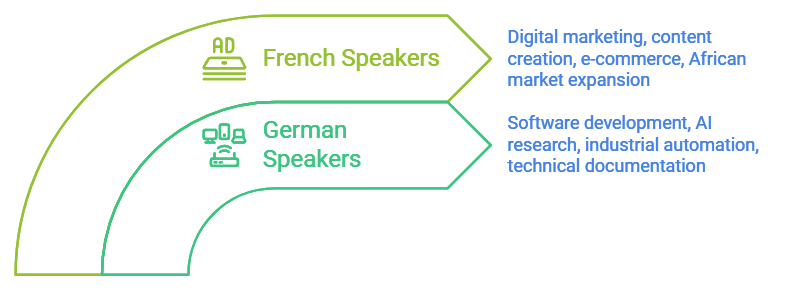Should You Learn French or German First? A Comprehensive Guide for Language Learners
The choice between learning French or German first largely depends on your personal goals, but French generally offers an easier starting point for English speakers. With its familiar vocabulary and less complex grammar, French typically requires 600-750 hours to reach fluency, compared to German’s 900 hours. However, your final decision should align with your career objectives and personal interests.
Key Takeaways
- French is generally easier for English speakers to learn initially
- German offers higher average salaries in technical fields
- French has broader global reach (300M speakers vs German’s 150M)
- Both languages provide strong digital economy opportunities
- Certification in either language significantly boosts career prospects
Language Learning Fundamentals
Learning either language requires dedication, but their approaches differ significantly. French shares more vocabulary with English, with about 45% of English words having French origins. German, while sharing a language family with English, has a more complex grammatical structure.
Learning Comparison Table:
| Feature | French | German |
|---|---|---|
| Time to Fluency | 600-750 hours | 900 hours |
| Vocabulary Similarity to English | High | Medium |
| Grammar Complexity | Moderate | High |
| Global Speakers | 300 million | 150 million |
| Countries as Official Language | 29 | 6 |
Professional Opportunities
The professional landscape for both languages offers unique advantages. Recent market analysis shows interesting trends:
Salary Impact by Industry:
- Technology: German commands 15% higher salaries
- Fashion & Luxury: French leads with 12% higher compensation
- Manufacturing: German shows 18% premium
- Tourism: Both languages offer similar benefits
Digital Economy Integration
The digital revolution has created new opportunities for both language speakers. German speakers are particularly sought after in:
- Software development
- AI research
- Industrial automation
- Technical documentation
French speakers find growing demand in:
- Digital marketing
- Content creation
- E-commerce
- African market expansion

Academic and Research Impact
Both languages carry significant weight in academia, but their strengths differ:
Research Publication Statistics:
- German leads in engineering and physical sciences
- French dominates in humanities and social sciences
- Both languages show strong presence in medical research
Certification Value
Professional language certifications have shown impressive ROI:
| Certification | Recognition Rate | Average Salary Increase |
|---|---|---|
| DELF/DALF (French) | 89% | 8-12% |
| TestDaF/Goethe (German) | 92% | 10-15% |
Modern Learning Approaches
Today’s language learners benefit from advanced technology:
AI-Powered Tools:
- Virtual reality immersion programs
- Adaptive learning platforms
- Speech recognition software
- Real-time translation practice
Remote Learning Opportunities
The post-pandemic era has expanded remote options:
- Virtual language exchange programs
- Online tutoring platforms
- Digital immersion experiences
- Interactive cultural workshops
Economic Impact and Future Trends
Recent market analysis reveals compelling opportunities:
Growth Sectors for Language Speakers:
- French in African tech markets (projected 12% annual growth)
- German in Industry 4.0 initiatives (15% job growth)
- Both languages in sustainable energy sectors
- Digital transformation projects
Regional Economic Factors
Economic indicators favor both languages but in different regions:
- German dominates Central European business
- French leads in African emerging markets
- Both show strong presence in EU institutions
- Growing demand in remote work opportunities
Making Your Decision
Consider these practical factors when choosing:
Personal Assessment Questions:
- What are your career goals?
- Which cultural sphere interests you more?
- How much time can you dedicate to learning?
- What’s your learning style?
Action Plan for Success
- Evaluate your goals and timeline
- Choose appropriate certification path
- Select learning tools and resources
- Set measurable milestones
- Track progress regularly
Final Thoughts
The choice between French and German ultimately depends on your personal and professional goals. French offers a gentler learning curve and broader global reach, making it an excellent first choice for many learners. However, German’s strong economic advantages and technical focus might better suit those in STEM fields or Central European business aspirations.
Remember, success in either language depends more on your dedication and learning approach than the initial choice. Consider starting with French if you’re new to language learning, or choose German if your professional goals align more closely with German-speaking regions and industries.
